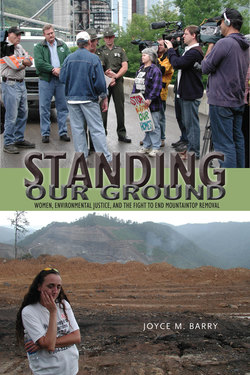Читать книгу Standing Our Ground - Joyce M. Barry - Страница 8
На сайте Литреса книга снята с продажи.
ОглавлениеACKNOWLEDGMENTS
I wish to acknowledge many people for their interest and assistance in the production of this book. Thanks for the support of everyone at Ohio University Press, particularly Gillian Berchowitz. I also want to thank Lynda Ann Ewen, whom I met at the annual Appalachian Studies Conference in 2009, and who expressed interest in this topic. Of course, I am deeply appreciative of those working to end mountaintop removal coal mining (MTR) in Appalachia, and especially grateful to all of the activists who shared their time and experiences with me when requested. Over the years so many have inspired, angered, and motivated me with their life stories and passion to secure justice in the Appalachian coalfields. In particular I wish to thank Vivian Stockman, Ohio Valley Environmental Coalition Project Coordinator, my first contact in the coalfields, who graciously put me in touch with many women fighting Big Coal in West Virginia. Thanks also to Freda Williams, who first made me aware of what life in the coalfields is like in this era of MTR; and to Maria Gunnoe, Sarah Haltom, Lorelei Scarbro, Pauline Canterbury, Mary Miller, and Patty Sebok.
I am immeasurably grateful to Julia “Judy” Bonds, who died of cancer on January 3, 2011, and to whom this book is dedicated. Many people consider Judy to be the godmother of the anti-MTR movement, an indefatigable woman who made the fight against MTR the local, national, and international environmental justice issue it is today. Judy, who was very generous with her time and knowledge, impressed me with the great sense of urgency she consistently demonstrated while fighting Big Coal in Appalachia. I enjoyed our conversations over the years, and this book could not have been written without her assistance. To me, Judy was one of those people you meet in life who change you just by knowing them. While her loss is deeply felt by many working to end MTR, her life’s work will continue to inspire and challenge all of us.
I would like to thank my supportive colleagues at Hamilton College: Vivyan Adair, Vige Barrie, Donald Carter, Katheryn Doran, Peter Cannavo, Amy Gowans, Barbara Gold, Margaret Gentry, Jenny Irons, Chaise LaDousa, Heather Merrill, Onno Oerlemans, Bill Pfitch, Carl Rubino, Katherine Terrell, Julio Videras, Robin Vanderwall, and Steve Yao. I also want to thank my amazing students at Hamilton College, who consistently challenge me with their passion for learning and intellectual curiosity. Thanks also to everyone at the Hamilton College Library (particularly the interlibrary loan department) for your help with this research. I was fortunate to receive a National Endowment of the Humanities summer grant in 2006 entitled “Regional Studies and the Liberal Arts: An Appalachian Exemplar,” and I would like to thank the facilitators of this program at Ferrum College, Ferrum, Virginia, for their support of this project. In particular I wish to thank Peter Crow, Tina Hanlon, Susan Mead, George Loveland, Daniel Woods, and my fellow participant Gloria Goodwin Raheja. And I am deeply indebted to Phillip G. Terrie, who was there when I first became interested in environmental justice and the impact of MTR in Appalachia, as a PhD student in the American Culture Studies Department at Bowling Green State University in Bowling Green, Ohio.
Finally, I wish to thank my mother, Viola Kathryn Barry, and my father, the late John Joseph Barry, for their love and support, and to other family members in West Virginia who, despite the controversial nature of this topic, had the courage to support this research. I could not have written this book without the emotional and intellectual assistance of my partner, Anne E. Lacsamana, who patiently read every word of the manuscript and served as my toughest editor. I am grateful for your love and commitment to this project and to me.
